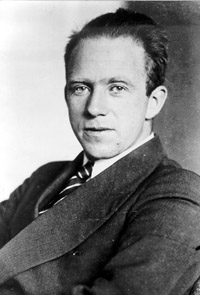There is Uncertainty about Heisenberg

Werner Heisenberg was born on this day in 1901 in Wurzburg, Germany.
As a youth, Werner Heisenberg earned a reputation as an academically ambitious character, with a cool exterior containing a fervent drive to succeed. Apart from his participation in the German youth movement during World War I and his support for the suppression of the Bavarian workers' revolt in 1919, Heisenberg's mind and activities were almost completely focused on physics. He studied at the University of Munich for 2 years, then moved to Gottingen in 1922 to study with Max Born. There he also met the 37-year old Niels Bohr, who remarked after taking a stroll with Heisenberg over the Hain mountain that Heisenberg "understands everything."
After Heisenberg received his doctorate, he followed Bohr to Copenhagen to work under him at the Institute of Physics. By this time, Bohr's reputation had been established through his improvements on Rutherford's description of the orbit of electrons around the nucleus of the atom (known as "the first quantum revolution," for which Bohr won the Nobel Prize), but even Bohr's improvements failed to explain certain observable phenomena.
Rather than continue to approach the issue through metaphor or purely visual descriptions of the orbit of electrons, in 1925 Heisenberg turned to mathematics, devising a set of matrices for what could be observed -- the effects of electron orbits on the absorption and emission of light -- and in the process developed a new version of quantum theory known as matrix mechanics. Soon afterward, Erwin Schrodinger proposed another mathematical model, wave mechanics, for the activity of electrons, and showed that although the two approaches described electrons in different ways, they were mathematically equivalent to each other.
In a 1927 paper called "On the Intuitive Content of Quantum Kinematics and Mechanics," Heisenberg proposed a radical yet elegant answer to Schrodinger's paradox. He proposed that the simultaneous measurement of connected variables (the position and momentum of an electron) is a losing proposition -- the more precisely you measure position, the less precise your measurement of momentum, and vice versa; and that this relationship of uncertainty, or at least the limits it poses with respect to the problem of describing electron orbits, is a precisely formulable relationship.
All statements about the atom, he continued, are governed by the "uncertainty principle," so that in effect, ordinary words, based on the limitations of human perception, cannot describe the atom. Although commentators, within the context of 20th century science crushing the holy certainty of the past, gorged themselves on Heisenberg's "uncertainty principle" and used it as a signpost in other areas, Heisenberg only applied it to the atom. Together with his mentor Bohr, whose deep-seated desire for consensus led to his proposal of "complementarity" (the notion that diametrically different characterizations must be employed for a full understanding of the atom), Heisenberg became one of the leading exponents of the "Copenhagen interpretation" of quantum mechanics, and he won the Nobel Prize for physics in 1932, with Schrodinger and Paul Dirac.
Although Heisenberg had the opportunity to leave Germany during the rise of Hitler, he chose to stay, suffering briefly at the hands of the Nazis for refusing to compromise his support for Einstein's physics, but Himmler exonerated him and he eventually was appointed director of the Kaiser Wilhelm Institute of Physics and of the German program to develop an atomic bomb. It appears that he accepted the task, but believed that physicists on both sides of the conflict in World War II should willfully avoid inventing the bomb, a position he hinted at during a meeting with Bohr, who subsequently fled to the U.S., in occupied Denmark in 1941 (hypothetically dramatized in Michael Frayn's play, Copenhagen, 1998).
Recently unearthed letters, addressed to him by Bohr but never sent, indicate that Heisenberg expressed to Bohr that if anyone would have the bomb, it would be the Germans. When Heisenberg learned of the Allied atomic bomb being dropped on Hiroshima, he initially refused to believe it. His later statements indicate that he did not think it was possible to construct such a bomb in time for it to have any effect on the War, so he did not press for the resources necessary to do so; it is suspected, too, that he arrogantly thought that the Allied scientists could do no better than he, and therefore, there was no question in his mind of needing to deliberately sabotage the German effort. Heisenberg was imprisoned briefly after the War, and then went on to resume his direction of the Kaiser Wilhelm (later Max Planck) Institute until 1970; yet there remained a certain ambiguity (if not "uncertainty") about his actions and motives during the War. He was a scientist, first and foremost, who is more fairly accused of having pride in his abilities as a scientist and a loyalty to the Germany that had trained him; a blinkard enabler rather than a patriot or a Nazi. He passed away on February 1, 1976 in Munich.
Labels: Physicists





0 Comments:
Post a Comment
Subscribe to Post Comments [Atom]
<< Home